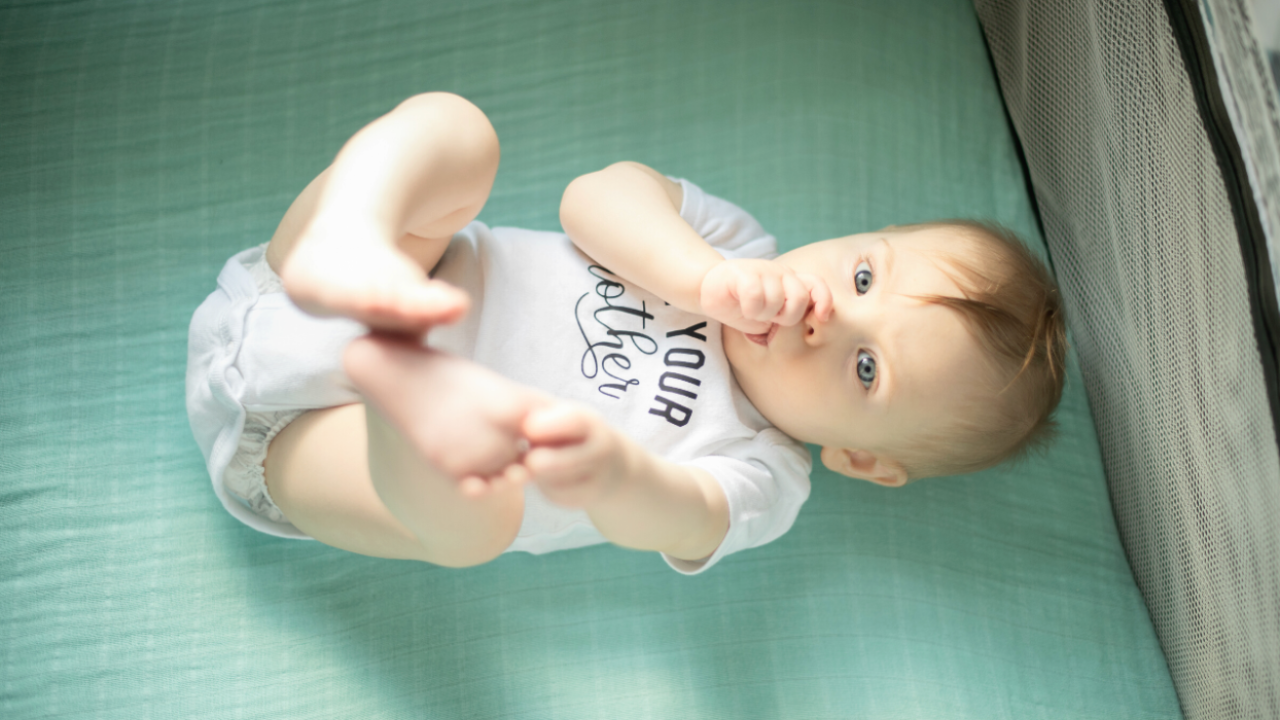The Main Causes Of Early Morning Wakes

5.18am. This was the early morning wake time that we were stuck on for weeks with little Evie! In a recent group of sleep deprived Moms, I asked if you could wave a magic wand and eliminate the biggest struggle with your baby’s sleep, what would that be? Nearly 1/3 of the Moms responded early morning wakes. If this is you, you’re most certainly not alone!
Early morning wakes are easily formed yet some of the hardest ones to break. There is not unfortunately a simple one response answer to get a quick solution as there are multiple factors that can cause an early morning wake.
To work through the possible causes of early morning wakes, it is really important that we firstly understand the biology to know what is going on. It will help you appreciate that your child is not simply a terrible sleeper and that there are a lot of factors that go against them to create an early morning wake!
Before we get started, I did want to clarify what we would define as an early morning wake up. To be clear, I am referring to a wake up between 4am-6am. Any wake-up time before 4am would still be considered a night wake. Any time after 6am is considered a normal, healthy time for your baby to wake up. It might not suit you to wake that early(!), but as far as infant and toddler sleep goes, that is considered a reasonable, normal time ☺

The above chart shows how our babies and toddlers cycle through different sleep stages through the night. As the night progresses, they spend less time in the deep stages of sleep. In fact, they don’t experience deep sleep for the second half of the night and cycle between stage 2 (mid sleep) and stage 1 (light sleep) only.
When our children are in the light stage of sleep, they can be easily awakened. This is particularly important to know in regards to their sleep environment. The coldest part of the night is usually between 4am-6am so if your child gets cold, they could awaken. They are also easily awakened by outside noises. When my alarm goes off at 5.30am for my Pilates class, if I don’t remember to keep the door ajar the night before, even the turning of the handle can wake up our girls!

The second chart (above) shows the relationship between our melatonin and cortisol hormone levels. Melatonin is the sleepy hormone that helps us to fall asleep and stay asleep. Melatonin levels naturally rise between 6pm-7.30pm and they peak around midnight. During this part of the evening is when our little ones achieve their deepest, most restorative sleep. The production of melatonin is dependent on the dark which is why it is always recommended for our babies to sleep in as dark space as you can create.
In contrast, cortisol levels (the stress hormone) lower in the evening which helps our little ones to fall asleep and they steadily rise from midnight which helps our babies to wake up for the morning. Cortisol can be comparable to our babies having adrenaline or caffeine in their system, which can really impact their sleep.
When we know that our hormones are cycling in our bodies to wake up in the morning and our babies and toddlers are also only experiencing light sleep stages, it is easy to understand why so many children can have early morning wakes.
Now that we understand the biological occurrences impacting early morning wakes, we can now look at the main contributing factors.
CAUSES:
1. Your child is too cold
Between 4am-6am is the coldest part of the night. Ensuring that you have your child’s room at a comfortable temperature (between 65°F-72°F) and dressed appropriately in a swaddle blanket or a sleep sack will help to avoid this becoming an issue.
You may need to use a heater with a thermostat that is triggered when the temperature drops below a certain temperature, or on a timer for the coldest part of the morning.
Below is a guide for how to appropriately dress your child.

2. The room is too bright
Even just the slightest bit of light can be a trigger for your child’s body to think that it is time to wake up!
Here is where you can get creative. There are lots of ways that you can work to block out the light to help the production of the amazing sleepy hormone melatonin. How do you know if it is dark enough? If you hold your hand up in front of your face, can you see it? If you can, make the room darker!
I know what you’re thinking…you think that the room is good enough. That is what I thought but our room was nowhere NEAR dark enough. We can’t underestimate the importance of the sleep environment for our little ones and if you have the chance of improving their sleep, why would you not try it??
3. There are distracting external noises
Do the rubbish trucks start their run super early in your neighbourhood? In the summer time, do you have loud birds that have decided to nest outside your window? Do you get up early to either try and fit in an exercise class or simply start your day so you have a few moments of quiet time before everyone else gets up?
Life happens! But even the slightest noise can wake up your little ones in the early hours of the morning. Their cortisol levels have been rising since midnight to prepare them for waking up, they have only been in light sleep stages and their sleep drive is at an all time low given that they have been asleep (hopefully!) for most of the night. So when one noise wakes them up and they can’t fall back to sleep, you’re going to be having an early start to your day!
Here is where white noise really comes into play. Its job is to mask outside noises so your little one only hears one consistent noise…the white noise. Play it as loud as the shower to ensure that it drowns out any external noises that may disrupt your child’s sleep.
4. Bedtime is too late
Contrary to popular belief, a later bedtime does not equal a later wake up. The opposite is actually true. Although it seems sounds counterintuitive, earlier bedtimes can actually help to resolve an early morning wake.
CASE STUDY: Little Harry who was 2 years old, was going to bed at the same time as his older brother and sister at 7pm. It made sense to do bedtime all at the same time, however Harry started to wake early which quickly turned into a habitual wake that spanned over a number of weeks. It also transpired that Harry after being so good at going to sleep independently previously started to have issues with settling again.
After assessing how much day sleep he was having as well as bringing his bedtime earlier just by 15-20 minutes, his early morning wake was corrected. That extra 15-20 minutes was causing Harry to become over tired and really impact his sleep…as well as the waking up the rest of his household!
5. The first nap of the day is too early –a continuation of night sleep
The timing of your child’s sleep in the morning can result in their little body to treat it as a continuation of night time sleep. If their bodies view that nap as an extension of their night sleep, they are being asked to sleep from 7pm-10am. They will therefore wake early so that they have enough sleep debt to be able to then sleep until 10am once they go down for their morning nap.
This can be addressed by a few options:
- Evaluate the wake windows of your child. You can download your little one’s age appropriate awake times HERE
- From 6 months of age, ensure that your baby’s first nap is no earlier than 8.30am. You want to be aiming for their first nap being between 9am-9.30am. Especially after 8 months of age.
- A short-term solution up until around 7-8 months of age is to give them a 10-15 minute bridging nap to make it to their first nap to avoid them getting overtired.
- Capping the first nap of the day can also help to address early morning wakes.
6. Baby is overtired at bedtime
This can be caused when the last wake window of the day is too long for your child leading them to becoming overtired.
Overtiredness triggers the production of cortisol (the stress hormone) and this hormone is not conducive to good sleep. Logically, you would think that if our babies are overtired, they would sleep longer but it unfortunately doesn’t work that way. The higher cortisol levels in their bodies can cause additional night wakes and also early morning wakes.
A guide to age-appropriate awakes times is HERE.
7. Baby is getting too much day sleep
It may feel like a constant balance of too much sleep vs. too little sleep but as your babies get older their naps will adjust also. When looking at our baby’s sleep, we look at it over a 24 hour period so if they have slept for too long during the day, they may have just had enough sleep!
Make sure to look at your baby’s total day sleep to assess if they are getting the right amount of sleep HERE.
8. Baby is not getting enough day sleep
In contrast to #7, if babies are not getting enough sleep during the day or they are only achieving short naps and not having deep, restorative sleep, they will be operating in a state of overtiredness
You may need to bring bed time forward to compensate with short naps, or up until 7-8 months of age, you may need to work in some bridging naps to avoid your child becoming overtired.
9. Parental (or sibling!) reinforcement (aka zeitgebers)
What the heck is a zeitgeber?!?!
The definition of a zeitgeber is an environmental agent or event that provides the cue for setting or resetting a biological clock.
Let me explain, as through my sleep consulting journey, I learnt that this is EXACTLY what went on in our own household.
5.18am. Evie would start stirring and make some noises . She was 11 months old at the time and sleeping in our bedroom which was right next to Annabelle’s bedroom. Evie would wake Annabelle up who in turn would jump out of bed, come into our room and go straight to Evie’s crib. Evie would then fully wake. That sealed the deal with the wake as it reinforced the habit which went on for weeks! The solution? Evie got evicted from our bedroom and moved into a make shift room that had a previous life as a play room ☺ Miraculously the early wakes got solved.
The same thing happens so often in families. Parents go in to try to calm or quieten their babies but as soon as their little ones see them, that cements the early morning wake. So what does this mean? No talking, growling, chatting, singing, bottles, breastfeeding, snacks, light that sneaks through from behind the curtains or under the door, etc between 5am-7am.
10. Hunger
For many parents in reference to not only early wakes, but night wakes, our automatic assumption is that our babies are hungry! That can in fact be the case, however it can also be difficult to determine if it is hunger vs. habit or comfort.
Commonly, this may occur in babies have been recently weaned off night feeds, or they need to start solids.
Increasing calories during the day can help prevent your little one from getting hungry. Once they start solids, adding protein to their lunch as well as offering homemade food can help to sustain them for longer.
11. Your child is unable to self-settle /Too drowsy at bedtime
Lastly, if If your baby or toddler is unable to fall asleep on their own at bedtime and they rely on you to go to sleep, it is unlikely that they will be able to put themselves back to sleep at 5am.
There can also be confusion, or a misunderstanding about drowsiness where in fact parents think that their baby is put down asleep, but they are actually already in their first sleep cycle. It therefore becomes a surprise when children wake up as parents thought that they were able to fall asleep on their own when that simply wasn’t the case.
This is where your child will need to work on their self-settling skills. By working on their self-settling skills to have the ability to fall asleep on their own at the START of bedtime, this will help them infinitely for not only early morning wakes but night wakes also.
PHEW! That is quite the extensive list, but early morning wakes can be such a problem for so many families and it can really help to problem solve to work out what is causing your little one to wake up early so that it can be fixed!













